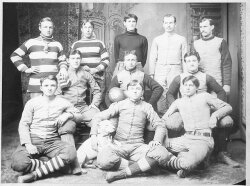Bowled over: NCAA lets foxes guard the henhouse
On April 23, 2010, the NCAA Football Issues Committee reviewed 37 applications and licensed 35 bowl games for the 2010-2013 seasons. Two new bowls, the Dallas Football Classic and the New Era Pinstripe, made the cut. Traditionally, the committee licenses bowls on a year-by-year basis, but last year the NCAA decided to issue four-year licenses, a decision from which they had to backtrack a year and a week later.
Besides David Letterman and the Brickyard, I don’t know much about Indiana other than what I’ve seen in movies like Hoosiers and Breaking Away, and what I’ve heard when a John Mellencamp song comes on the radio. What I do know is that Indiana is not the South. So why the NCAA– headquartered in Indianapolis– is loath to talk about money is beyond me. As of April 28, the NCAA is going to have to talk about money whether they find it tacky or not.
The NCAA licensed 35 bowls this year based solely on financial criteria; beyond that, the NCAA's involvement is only supposed to ensure the safety and well-being of student-athletes, though their definition of well-being must be pretty liberal. As John Solomon from The Birmingham News put it, “Bowl games typically get a rubber stamp for approval.” But the NCAA would have us believe all that is going to change.
In response to the cesspool that is the Fiesta Bowl, NCAA president Mark Emmert said, “It became clear to me that a review of those criteria of those processes was overdue.” So like all good bureaucratic agencies, the NCAA approved a new task force to review its licensing process and put a three-year hold on any new games until updated standards are instituted. The new task force will be co-chaired by Nebraska chancellor Harvey Perlman and include no more than 10 people, only one of whom must be from outside higher education and unrelated to athletics.
So what exactly is this task force supposed to do? Play at being IRS agents, apparently. According to ESPN, the task force will look into the oversight of bowl-sponsoring agencies, conflict-of-interest rules and policies, advertising and title-sponsorship standards, along with oversight and reporting of financial management of bowl games. Considering the task force primarily includes people representing institutions that receive millions of dollars from the BCS, the whole thing reeks of impropriety from the get-go.
Under current rules, championship teams of the Atlantic Coast, Big 12, Big East, Big Ten, Pacific-10, and Southeastern Conferences go to the BCS automatically. In 2009, the first team in each conference received $18 million whether they won or lost; they then distributed the money within the conference. If a second team from a conference qualified, the conference received an additional $4.5 million. Smaller conference teams who made bowl games got one-tenth of what the big teams did and still had to share it.
Multiply those millions by 35 bowl games, and you’ll begin to get an idea of why any task force with a vested interest in college football is a bad idea.
It’s not the money the schools don’t see that has prompted the NCAA to create the task force. It’s the money BCS bowls use for their own whims that has everybody in a snit, and that’s what anyone associated with college football can’t afford to investigate. Recent figures show the Pacific Life Holiday Bowl, the Tostitos Fiesta Bowl, FedEx Orange Bowl, Rose Bowl presented by Citi, Allstate Sugar Bowl, and the BCS National Championship Game payout around $17 million each, for a total of $85 million. In comparison, the 30+ non-BCS bowl games have payouts totaling roughly $43 million.
You tell me if Harvey Perlman is going to turn the screws on the BCS when Nebraska has 46 bowl appearances and is on the rise again? Will anyone else on the NCAA’s task force be willing to risk offending an agency that holds such lucrative purse strings? It’s a bet I wouldn’t be willing to make. Like Malik Bowen said in the Muhammad Ali documentary, When We Were Kings, “You can do whatever you want around a sleeping elephant, whatever you want. But when he wakes up, he tramples everything.”
~
Juanita lives on a farm in Charlotte County with her husband, son, and many dogs.
